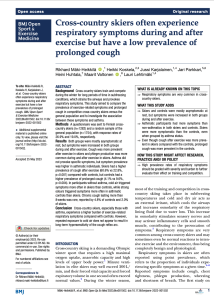Cross-country skiers often experience respiratory symptoms during and after exercise but have a low prevalence of prolonged cough
Rikhard Mäki-Heikkilä1 Heikki Koskela2,3, Jussi Karjalainen1,4, Jari Parkkari5,6, Heini Huhtala7, Maarit Valtonen8, Lauri Lehtimäki1,4
alla suomeksi
Background
Cross-country skiers train and compete during the winter for long periods of time in subfreezing conditions, which strains the airways and provokes respiratory symptoms. This study aimed to compare the prevalence of exercise-related symptoms and prolonged cough in competitive cross-country skiers versus the general population and to investigate the association between these symptoms and asthma.
Methods
A questionnaire was sent to Finnish cross-country skiers (n=1282) and a random sample of the general population (n=1754), with response rates of 26.9% and 19.0%, respectively.
Results
Both groups were mostly asymptomatic at rest, but symptoms were increased in both groups during and after exercise. Cough was more prevalent after exercise in skiers and phlegm production was more common during and after exercise in skiers. Asthma did not provoke specific symptoms, but symptom prevalence was higher in asthmatic individuals. Skiers had a higher prevalence of cough after exercise (60.6% vs 22.8%, p<0.001) compared with controls, but controls had a higher prevalence of prolonged cough (4.1% vs 9.6%, p=0.004). In participants without asthma, cold air triggered symptoms more often in skiers than controls, while strong odours triggered symptoms more often in asthmatic controls than skiers. Chronic cough lasting more than 8 weeks was rare, reported by 4.8% of controls and 2.0% of skiers.
Conclusion
Cross-country skiers, especially those with asthma, experience a higher burden of exercise-related respiratory symptoms compared with controls. However, repeated exposure to cold air does not appear to result in long-term hypersensitivity of the cough reflex arc.
Tausta
Maastohiihtäjät harjoittelevat ja kilpailevat talvella pitkiä aikoja pakkasolosuhteissa, mikä rasittaa hengitysteitä ja aiheuttaa hengitystieoireita. Tämän tutkimuksen tavoitteena oli verrata maastohiihtäjien ja muun väestön välillä liikuntaan liittyvien oireiden ja pitkittyneen yskän esiintyvyyttä sekä tutkia näiden oireiden ja astman välistä yhteyttä.
Menetelmät
Kysely lähetettiin suomalaisille maastohiihtäjille (n=1282) ja satunnaisotokselle samanikäisestä väestöstä (n=1754). Vastausprosentit olivat 26,9% ja 19,0%.
Tulokset
Molemmat ryhmät olivat pääosin oireettomia levossa, mutta oireet lisääntyivät molemmissa ryhmissä rasituksen aikana ja sen jälkeen. Yskä oli yleisempää harjoituksen jälkeen hiihtäjillä sekä limaneritys oli yleisempää rasituksen aikana ja sen jälkeen hiihtäjillä. Astma ei aiheuttanut tiettyjä oireita, mutta oireiden esiintyvyys oli suurempi astmaa sairastavilla. Hiihtäjillä oli suurempi esiintyvyys yskälle harjoituksen jälkeen (60,6% vs. 22,8%, p < 0,001) verrattuna verrokeihin, mutta kontrolliryhmällä oli suurempi esiintyvyys pitkittyneelle yskälle (4,1% vs. 9,6%, p = 0,004). Astmaa sairastamattomilla kylmä ilma aiheutti oireita useammin hiihtäjillä kuin verrokeilla, kun taas voimakkaat hajut aiheuttivat oireita useammin astmaatikoilla verrokeilla kuin hiihtäjillä. Yli kahdeksan viikkoa kestävä krooninen yskä oli harvinaista ja sitä oli 4,8% verrokeilla ja 2,0% hiihtäjillä.
Johtopäätökset
Erityisesti astmaa sairastavat maastohiihtäjät kokevat enemmän liikuntaan liittyviä hengitystieoireita kuin verrokit. Toistuva altistuminen kylmälle ilmalle ei kuitenkaan näytä aiheuttavan pitkäaikaista yskän refleksikaaren herkistymistä.
1Faculty of Medicine and Health Technology, Tampere University, Tampere, Finland, 2Unit for Medicine and Clinical Research, Pulmonary Division, Kuopio University Hospital, Kuopio, Pohjois-Savo, Finland, 3Institute of Clinical Sciences, Faculty of Health Sciences, University of Eastern Finland School of Medicine, Kuopio, Pohjois-Savo, Finland, 4Allergy Centre, Tampere University Hospital, Tampere, Pirkanmaa, Finland 5Tampere Research Center of Sports Medicine, UKK Institute, Tampere, Pirkanmaa, Finland, 6Faculty of Sport and Health Sciences, University of Jyväskylä, Jyvaskyla, Finland, 7Faculty of Social Sciences, Tampere University, Tampere, Pirkanmaa, Finland, 8Finnish Institute of High Performance Sport KIHU, Jyväskylä, Finland
